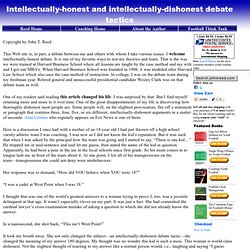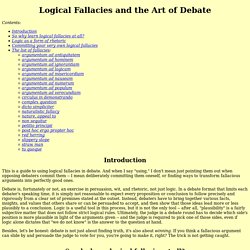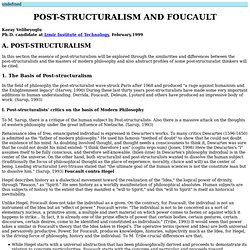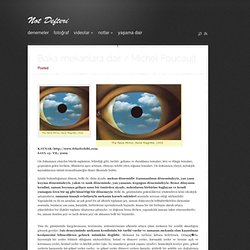

Essays of Schopenhauer, by Arthur Schopenhauer. The Fool Has Said. ÇEVİRİ EYLEM. - Devrim / Felix Guattari. Intellectually honest and intellectually dishonest debate tactics. Copyright by John T.

Reed This Web site is, in part, a debate between me and others with whom I take various issues. I welcome intellectually-honest debate. It is one of my favorite ways to test my theories and learn. That is the way we were trained at Harvard Business School where all lessons are taught by the case method and my wife and I got our MBA's. One of my readers said reading this article changed his life. Here is a discussion I once had with a mother of an 18-year old I had just thrown off a high school varsity athletic team I was coaching. I thought that was one of the world’s greatest answers to a woman trying to prove I, too, was a juvenile delinquent at that age. It took my breath away.
Although I am fond of intellectually-honest debate, about 90% to 95% of the statements made by my opponents to prove that I am wrong have been of the intellectually-dishonest variety. Lest I be accused of intellectually-dishonest debate myself, I hereby explain the difference. Logical Fallacies and the Art of Debate. Contents: Introduction This is a guide to using logical fallacies in debate.

And when I say "using," I don't mean just pointing them out when opposing debaters commit them -- I mean deliberately committing them oneself, or finding ways to transform fallacious arguments into perfectly good ones. Debate is, fortunately or not, an exercise in persuasion, wit, and rhetoric, not just logic. In a debate format that limits each debater's speaking time, it is simply not reasonable to expect every proposition or conclusion to follow precisely and rigorously from a clear set of premises stated at the outset. Besides, let's be honest: debate is not just about finding truth, it's also about winning. So why learn logical fallacies at all? I can think of a couple of good reasons. Second, and maybe more importantly, pointing out a logical fallacy is a way of removing an argument from the debate rather than just weakening it. Logic as a form of rhetoric Committing your very own logical fallacies Straw man. Post-structuralism and Foucault.
Undefined Koray Velibeyoglu Ph.D. candidate at Izmir Institute of Technology, February,1999 In this section the essence of post-structuralism will be explored through the similarities and differences between the post-structuralists and the masters of modern philosophy and also abstract profiles of some post-structuralist thinkers will be cited. 1.

Başka mekanlara dair / Michel Foucault. On dokuzuncu yüzyılın büyük saplantısı, bilindiği gibi, tarihti: gelişme ve duraklama temaları, kriz ve döngü temaları, geçmişten gelen birikim, ölümlerin aşırı artması, dünyayı tehdit eden soğuma temaları.

On dokuzuncu yüzyıl, mitolojik kaynaklarının özünü termodinamiğin ikinci ilkesinde buldu. İçinde bulunduğumuz dönem, belki de, daha ziyade, mekan dönemidir. Eşzamanlının dönemindeyiz, yan yana koyma dönemindeyiz, yakın ve uzak döneminde, yan yananın, kopuğun dönemindeyiz. Bence dünyanın kendini, zaman boyunca gelişen uzun bir ömürden ziyade, noktalarını birbirine bağlayan ve kendi yumağını ören bir ağ gibi hissettiği bir dönemeyiz. Belki de, günümüzün polemiklerini yönlendiren kimi ideolojik çatışmaların, zamanın inançlı evlatlarıyla mekanın kararlı sakinleri arasında cereyan ettiği söylenebilir. Günümüzde ise, yerleştirilmenin yerini almış olan uzamın yerine mevki geçti. Bununla birlikte, bu analizler, çağdaş düşünce için çok önemli olsalar da, özellikle iç mekanla ilgilidirler.
M. Radio Active Philosophy. Psychoanalysis « Fractal Ontology. Körotonomedya.